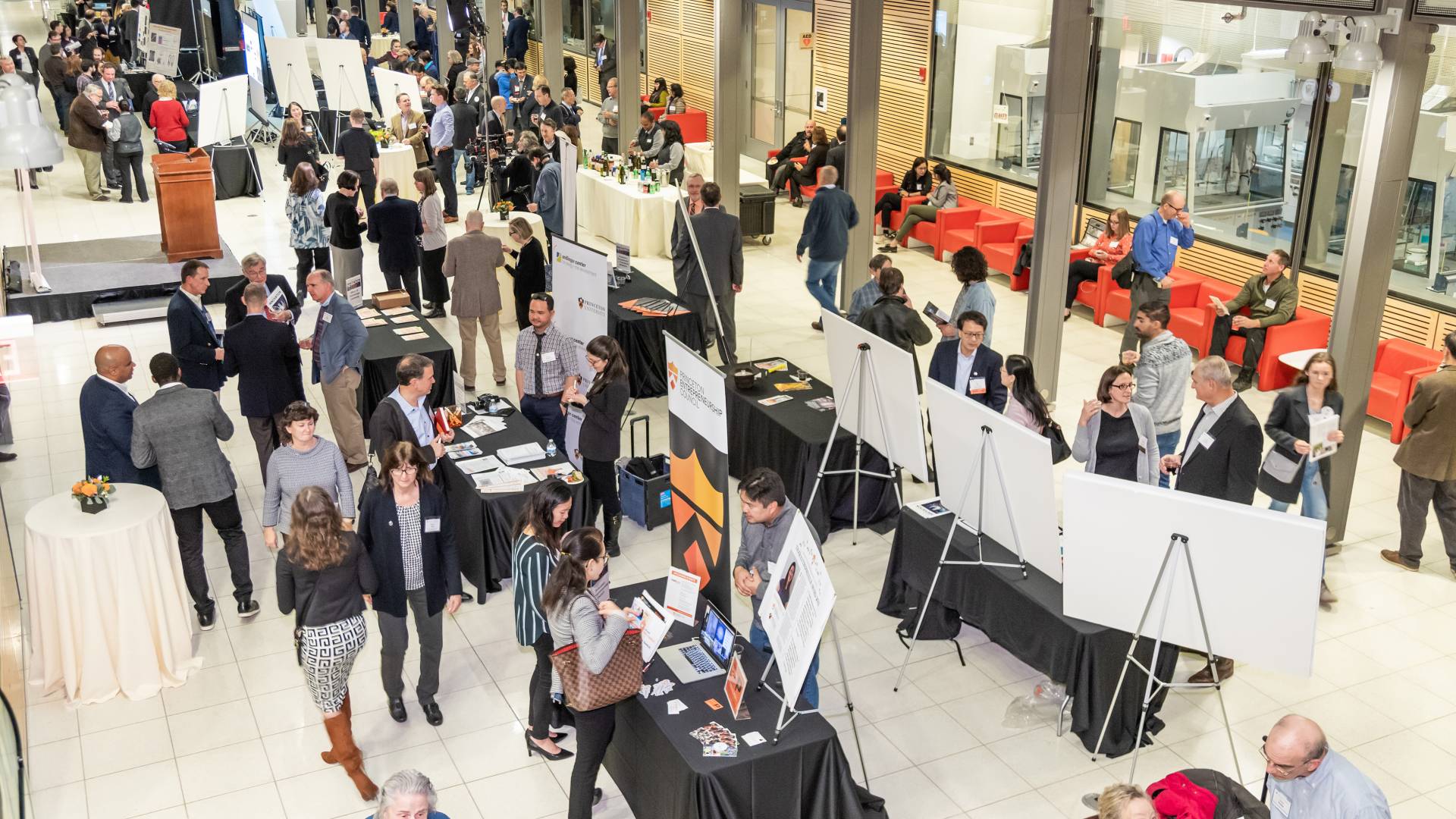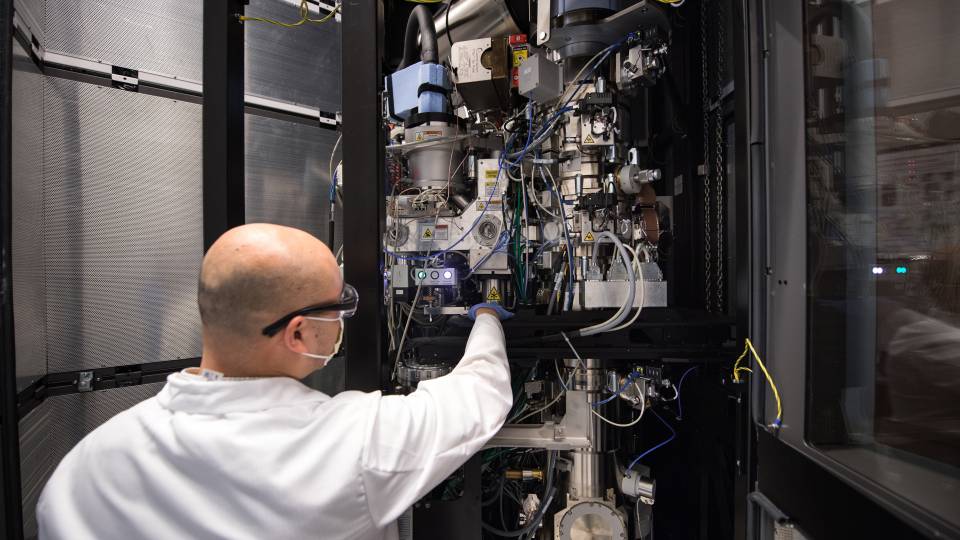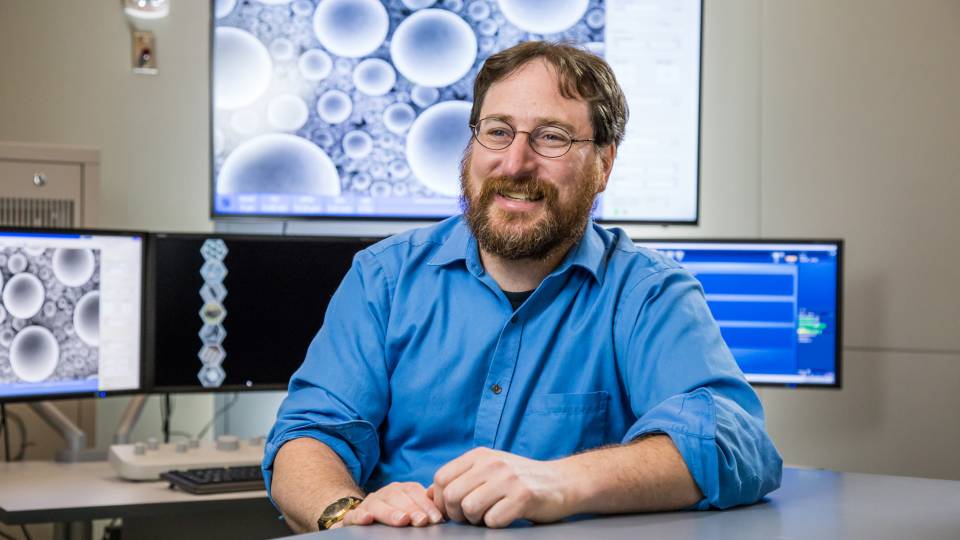Held annually, Celebrate Princeton Innovation (CPI) highlights research with the potential to have real-world impact in areas such as health, energy and the environment. The event offers opportunities for investors, industry leaders and other members of the broader innovation ecosystem to meet Princeton faculty researchers and their teams. This year’s event was held Nov. 14 in the Frick Chemistry Building Atrium.
Speaking at Princeton's annual technology showcase on Nov. 14, Princeton's inaugural Vice Dean for Innovation Rodney Priestley delivered Princeton's vision for engaging in entrepreneurship in ways that have societal impact.
"Princeton's informal motto is 'In the nation’s service and the service of humanity,'" said Priestley, who is also a professor of chemical and biological engineering. "Our innovation efforts are very much in support of that motto.”
He continued, "Our goal is to shorten the timeline between when fundamental research discoveries are made and when those discoveries have a beneficial impact on people’s lives."
Priestley made the remarks at Celebrate Princeton Innovation (CPI), an event that highlights the work of faculty and student researchers who are making discoveries and creating inventions with the potential for having broad societal impact, including in areas such as health and the environment.
The gathering attracts members of the broader entrepreneurial ecosystem outside the University — such as members of the venture capital community, industry, as well as representatives from state and local governments — who come to learn about the newest University discoveries and meet the faculty and staff engaged in Princeton's innovation initiative. The event, which was held in the Frick Chemistry Laboratory Atrium, is hosted by the Office of the Dean for Research.

Princeton President Christopher L. Eisgruber was honored for his commitment to innovation as the 2019 Educator of the Year by the Research and Development Council of New Jersey on the same night of the CPI reception. A video highlighting Eisgruber's support for innovation at Princeton was shown at the council’s awards banquet. Supporting innovation is crucial for faculty researchers in ensuring that their work has the opportunity to improve the world. It is also important for Princeton students who want to address social, cultural and economic problems through entrepreneurial activity.
"Princeton's research spans the range from projects that address global challenges to open-ended inquiry driven by intellectual curiosity about how the world works," said Dean for Research Pablo Debenedetti, the Class of 1950 Professor of Engineering and Applied Science and professor of chemical and biological engineering. "The University has not altered its support for this full range of research, but what is new is our strengthened commitment to provide researchers with opportunities to transition research to the world outside the University, where it can make a difference in people’s lives."
To meet the demand for entrepreneurial opportunities, Princeton has broadened innovation and entrepreneurship activities and educational programming in ways that enrich the University’s teaching and research mission.
These activities include appointing Priestley as the first vice dean for innovation, a position conceived to provide academic leadership for innovation and entrepreneurship activities across campus.
"You can't have innovation without fundamental research — they are naturally connected," said Priestley, who is a co-inventor of four patent-pending technologies and co-founder of two startups. "At Princeton, we are working jointly to bring fundamental research and innovation closer together and to create pathways to help faculty and students translate their research into products and services that will have real societal impact."

At the reception were (left to right): Dean for Research Pablo Debenedetti; Anne-Marie Maman, executive director of the Princeton Entrepreneurship Council; Vice Dean for Innovation Rodney Priestley; and New Jersey Assemblyman Andrew Zwicker, a physicist and head of science education at the Princeton Plasma Physics Laboratory.
Additional steps include the opening in 2018 of Princeton Innovation Center BioLabs, where startup companies originating in University research, as well as from the surrounding area, can develop early-stage technologies, as well as expanded capacity to form research collaborations with industry and transition University discoveries into startups and other ventures.
This move toward greater support for collaborations and startups has already paid off. Collaborations between the University and industry — which provide researchers with a broader spectrum of topics and challenges — have increased substantially. Startups also have blossomed, with seven new companies started in the last fiscal year.
One of these startups is Evrys Bio, which is developing broad-spectrum antiviral therapies based on research conducted in the laboratories of Professor of Molecular Biology Ileana Cristea and Thomas Shenk, the James A. Elkins Jr. Professor in the Life Sciences. The company, located in Doylestown, Pennsylvania, is exploring treatments that are active against a variety of viruses, including hepatitis and Ebola.
Princeton also has bolstered educational opportunities for students by expanding the Keller Center for Innovation in Engineering Education's programming, and opening the Princeton Entrepreneurial Hub three years ago in downtown Princeton, providing working space for University educational and startup activities.
In addition, the University created the Princeton Entrepreneurship Council to engage alumni, who play a substantial role in Princeton's innovation ecosystem. Each year the council gives the Tiger Entrepreneur Award to students or early-career alumni who demonstrate success in entrepreneurship. This year’s award was given to Natalie Tung, Class of 2018, who co-founded HomeWorks Trenton, a nonprofit organization that operates a community-based after-school boarding program that provides housing, meals and an educational environment to female students. Anne-Marie Maman, executive director of the Princeton Entrepreneurship Council, honored Tung with the award at the CPI reception.
Present at the event to discuss their inventions and discoveries were nine Princeton faculty researchers and their teams:
- Sigrid Adriaenssens, associate professor of civil and environmental engineering, and Victor Charpentier, postdoctoral research associate: Solar shade that saves energy and improves comfort in buildings
- Minjie Chen, assistant professor of electrical engineering and the Andlinger Center for Energy and the Environment: Technology to boost energy efficiency in data centers
- Esteban Engel, viral neuroengineering facility manager at the Princeton Neuroscience Institute: Novel gene-delivery technology for treatment of disease
- Yiguang Ju, Robert Porter Patterson Professor of Mechanical and Aerospace Engineering: HiT Nano Inc. makes high-performance batteries affordable
- Mala Murthy, professor of neuroscience, and Joshua Shaevitz, professor of physics and the Lewis-Sigler Institute for Integrative Genomics: AI-based motion-capture system for lab animals
- Jeffrey Schwartz, professor of chemistry, and Jean Schwarzbauer, the Eugene Higgins Professor of Molecular Biology: Nerve damage repair using a patterned extracellular matrix
- Amit Singer, professor of mathematics and the Program in Applied and Computational Mathematics: Software for near-atomic resolution using cryo-electron microscopy
- James Link, professor of chemical and biological engineering: Lasso-shaped antibiotic for the treatment of lung infections
Two undergraduate-led companies were also on display:
- Invictis Technologies: Developing a portable automatic intravenous injection device that allows quick and reliable intravenous injections
- WellPower: Building solar-powered water purifiers to provide communities with access to clean water
Celebrate Princeton Innovation also featured several research centers from campus that support innovation through research and collaborations with industry:
- Andlinger Center for Energy and the Environment: Partners with industry to find solutions to challenges including energy sustainability and climate change
- Princeton Institute for the Science and Technology of Materials: Makes its state-of-the-art facilities available to industrial affiliates as well as researchers from other universities
- Princeton Plasma Physics Laboratory: Develops safe and renewable fusion power and related inventions
The reception was sponsored by Fitz Gate Ventures, a venture capital fund that invests a majority of its capital in companies from the Princeton ecosystem, and Hamilton Brook Smith and Reynolds Intellectual Property Law, a full-service law firm offering expertise across the range of intellectual property activities.

One of the technologies on display was an energy-saving window covering that provides optimal shade by moving throughout the day in a manner similar to how plants follow the sun. The technology was developed by Sigrid Adriaenssens, associate professor of civil and environmental engineering, and Victor Charpentier, a postdoctoral research associate.






